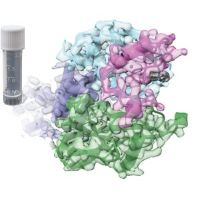Specification
| Description | Recombinant protein from the full-length sequence of Homo sapiens taste 2 receptor member 38 (TAS2R38) (NM_176817). |
| Organism | Homo sapiens (Human) |
| Expression Host | Human Cells |
| Tag Info | His or DYKDDDDK. Please contact us if you need further information or require specific designed tag. |
| Purity | Greater than 90% by SDS-PAGE gel |
| Uniprot ID | P59533 |
| Entry Name | T2R38_HUMAN |
| Gene Names | TAS2R38 PTC |
| Alternative Gene Names | PTC |
| Alternative Protein Names | Taste receptor type 2 member 38 (T2R38) (PTC bitter taste receptor) (Taste receptor type 2 member 61) (T2R61) |
| Application | Antigens, Western, ELISA and other in vitro binding or in vivo functional assays, and protein-protein interaction studies; For research & development use only! |
| Buffer | Purified protein formulated in a sterile solution of PBS buffer, pH7.2, without any preservatives |
| Endotoxin | Endotoxin level is < 0.1 ng/µg of protein (<1EU /µg) |
| Length | 333 |
| Molecular Weight(Da) | 37892 |
| Protein Sequence | (The sequence of expressed protein may have some variation from the sequence shown below. Please contact us for the exact sequence.) MLTLTRIRTVSYEVRSTFLFISVLEFAVGFLTNAFVFLVNFWDVVKRQALSNSDCVLLCLSISRLFLHGLLFLSAIQLTHFQKLSEPLNHSYQAIIMLWMIANQANLWLAACLSLLYCSKLIRFSHTFLICLASWVSRKISQMLLGIILCSCICTVLCVWCFFSRPHFTVTTVLFMNNNTRLNWQIKDLNLFYSFLFCYLWSVPPFLLFLVSSGMLTVSLGRHMRTMKVYTRNSRDPSLEAHIKALKSLVSFFCFFVISSCAAFISVPLLILWRDKIGVMVCVGIMAACPSGHAAILISGNAKLRRAVMTILLWAQSSLKVRADHKADSRTLC |
Background
| Function | FUNCTION: Receptor that may play a role in the perception of bitterness and is gustducin-linked. May play a role in sensing the chemical composition of the gastrointestinal content. The activity of this receptor may stimulate alpha gustducin, mediate PLC-beta-2 activation and lead to the gating of TRPM5 (By similarity). {ECO:0000250}. |
| Pathway | |
| Protein Families | G-protein coupled receptor T2R family |
| Tissue Specificity | Expressed in subsets of taste receptor cells of the tongue and exclusively in gustducin-positive cells. Expressed in testis (PubMed:16720576). {ECO:0000269|PubMed:16720576}. |
QC Data
| Note | Please contact us for QC Data |
| Product Image (Reference Only) |  |

